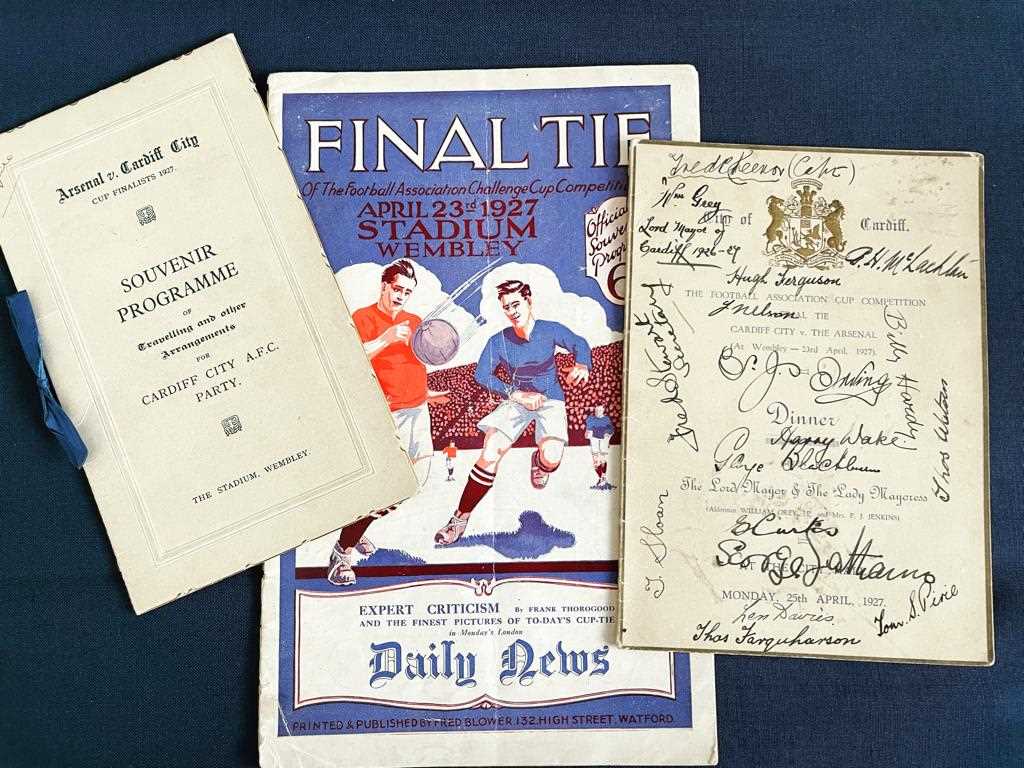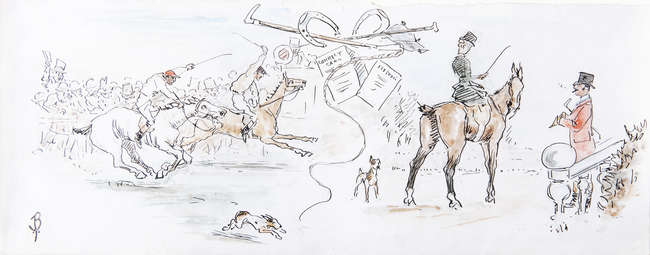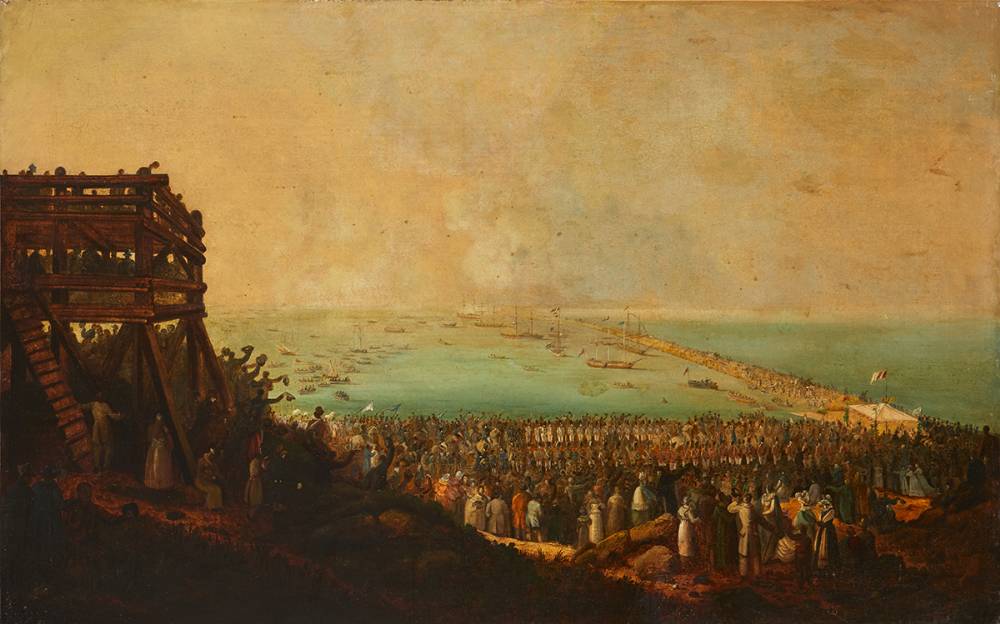"While the crowd was assembling in front of the house and before the President went up-stairs to the window from which he was to speak, I was with him, and noticed that he carried a roll of manuscript in his hand From a point of concealment behind the window drapery I held a light while he read, dropping the pages of his written speech one by one upon the floor as he finished them. Little Tad scrambled around on the floor, importuning his father to give him 'another,' as he collected the sheets of paper fluttering from the President's hand." -Noah Brooks LINCOLN, Abraham. Autograph manuscript of HIS LAST ADDRESS as President, delivered in Washington D.C. from the window of the White House on the evening of 11 April 1865. 12 pages, large folio (13¾ x 8 3/8 in.), boldly penned in dark ink on the rectos only of 12 sheets of fine-quality lined paper, 22 lines to the page, each leaf skillfully inlaid to a larger sheet. Paginated by Lincoln "A, B, 1-10" in upper margin of each page. A final draft, but with two pencilled word insertions and four word changes in the text by Lincoln (page.A "restrained" for "repressed"; page 1 "should" for "would"; "they never having been out of it" for "being already in"; page 7 "on the" for "however), a few small smudges to page "A," otherwise IN SUPERB CONDITION. Bound ca.1890 in half red morocco and marbled paper boards, spine gilt-lettered "THE LAST SPEECH OF ABRAHAM LINCOLN, April 11, 1865 ORIGINAL MANUSCRIPT"; expertly removed from binding, each leaf expertly matted for display . "WE MEET THIS EVENING NOT IN SORROW, BUT IN GLADNESS OF HEART": PRESIDENT LINCOLN'S LAST ADDRESS, DELIVERED AT THE WHITE HOUSE THE DAY AFTER LEE'S SURRENDER THREE DAYS BEFORE LINCOLN'S ASSASSINATION AN ARDENT, CAREFULLY REASONED JUSTIFICATION OF LINCOLN'S PLAN FOR RECONSTRUCTION, CONTAINING THE FIRST PUBLIC ENDORSEMENT BY ANY PRESIDENT OF THE ENFRANCHISEMENT OF AFRICAN-AMERICAN FORMER SLAVES THE LAST MANUSCRIPT OF A COMPLETE LINCOLN SPEECH STILL IN PRIVATE HANDS Even before he took the oath as President of a deeply divided nation, the precipitate secession of 13 slave-holding states thrust upon Lincoln not only the momentous military and political issues of civil war, but also made it essential to plan for the eventual reconstruction of the shattered Union, the task he here terms "the re-inauguration of the national authority." If, as Lincoln believed, the Union would ultimately be victorious in the bloody conflict, it was incumbent upon the President to formulate clear plans for the restoration of the functions of the Federal government within the seceded states and the respective state governments in a logical, humane manner consistent with the Constitution. And, of equal urgency, what would be the status of the hundreds of thousand of newly freed slaves within those former Confederate states? What rights would former slaves enjoy? For the destruction of slavery as the result of the war had "permanently transformed the war's character, and produced far-reaching conflicts and debates over the role former slaves and their descendants would play in American life and the meaning of the freedom they had acquired." In truth, "the issues central to Reconstruction are as old as the American republic, and as contemporary as the inequalities that still afflict our society" (Eric Foner, Reconstruction: America's Unfinished Revolution 1863-1877 , New York, 1988, p.xxvii). While it fell to Lincoln to begin this arduous and complex process, his premature death meant that Reconstruction's eventual path was--for better or for worse--directed by different men, some far less sympathetic to the former Confederate states and their citizens than the 16th President. "THE GREAT PROBLEM PRESSING UPON THE NATION" From the early months beginning of the war, Lincoln had given careful consideration to the terms under which the Southern states might be restored to the Union. There were, unfortunately, no precedents to guide him, and his i
"While the crowd was assembling in front of the house and before the President went up-stairs to the window from which he was to speak, I was with him, and noticed that he carried a roll of manuscript in his hand From a point of concealment behind the window drapery I held a light while he read, dropping the pages of his written speech one by one upon the floor as he finished them. Little Tad scrambled around on the floor, importuning his father to give him 'another,' as he collected the sheets of paper fluttering from the President's hand." -Noah Brooks LINCOLN, Abraham. Autograph manuscript of HIS LAST ADDRESS as President, delivered in Washington D.C. from the window of the White House on the evening of 11 April 1865. 12 pages, large folio (13¾ x 8 3/8 in.), boldly penned in dark ink on the rectos only of 12 sheets of fine-quality lined paper, 22 lines to the page, each leaf skillfully inlaid to a larger sheet. Paginated by Lincoln "A, B, 1-10" in upper margin of each page. A final draft, but with two pencilled word insertions and four word changes in the text by Lincoln (page.A "restrained" for "repressed"; page 1 "should" for "would"; "they never having been out of it" for "being already in"; page 7 "on the" for "however), a few small smudges to page "A," otherwise IN SUPERB CONDITION. Bound ca.1890 in half red morocco and marbled paper boards, spine gilt-lettered "THE LAST SPEECH OF ABRAHAM LINCOLN, April 11, 1865 ORIGINAL MANUSCRIPT"; expertly removed from binding, each leaf expertly matted for display . "WE MEET THIS EVENING NOT IN SORROW, BUT IN GLADNESS OF HEART": PRESIDENT LINCOLN'S LAST ADDRESS, DELIVERED AT THE WHITE HOUSE THE DAY AFTER LEE'S SURRENDER THREE DAYS BEFORE LINCOLN'S ASSASSINATION AN ARDENT, CAREFULLY REASONED JUSTIFICATION OF LINCOLN'S PLAN FOR RECONSTRUCTION, CONTAINING THE FIRST PUBLIC ENDORSEMENT BY ANY PRESIDENT OF THE ENFRANCHISEMENT OF AFRICAN-AMERICAN FORMER SLAVES THE LAST MANUSCRIPT OF A COMPLETE LINCOLN SPEECH STILL IN PRIVATE HANDS Even before he took the oath as President of a deeply divided nation, the precipitate secession of 13 slave-holding states thrust upon Lincoln not only the momentous military and political issues of civil war, but also made it essential to plan for the eventual reconstruction of the shattered Union, the task he here terms "the re-inauguration of the national authority." If, as Lincoln believed, the Union would ultimately be victorious in the bloody conflict, it was incumbent upon the President to formulate clear plans for the restoration of the functions of the Federal government within the seceded states and the respective state governments in a logical, humane manner consistent with the Constitution. And, of equal urgency, what would be the status of the hundreds of thousand of newly freed slaves within those former Confederate states? What rights would former slaves enjoy? For the destruction of slavery as the result of the war had "permanently transformed the war's character, and produced far-reaching conflicts and debates over the role former slaves and their descendants would play in American life and the meaning of the freedom they had acquired." In truth, "the issues central to Reconstruction are as old as the American republic, and as contemporary as the inequalities that still afflict our society" (Eric Foner, Reconstruction: America's Unfinished Revolution 1863-1877 , New York, 1988, p.xxvii). While it fell to Lincoln to begin this arduous and complex process, his premature death meant that Reconstruction's eventual path was--for better or for worse--directed by different men, some far less sympathetic to the former Confederate states and their citizens than the 16th President. "THE GREAT PROBLEM PRESSING UPON THE NATION" From the early months beginning of the war, Lincoln had given careful consideration to the terms under which the Southern states might be restored to the Union. There were, unfortunately, no precedents to guide him, and his i


/113437/Internet%20Image%201.jpg)
/17913/Internet%20Image%201.jpg)


.jpg)







Testen Sie LotSearch und seine Premium-Features 7 Tage - ohne Kosten!
Lassen Sie sich automatisch über neue Objekte in kommenden Auktionen benachrichtigen.
Suchauftrag anlegen